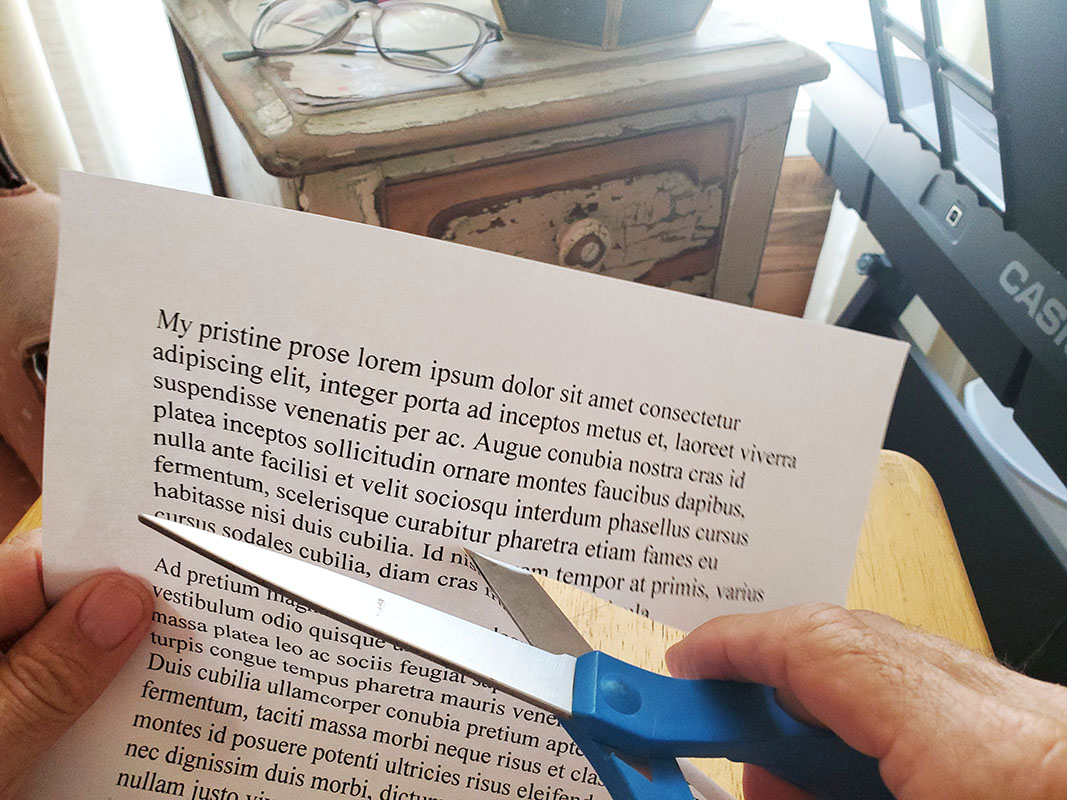 Oct 11, 2023–Anyone who writes does so in dread of editors.
Oct 11, 2023–Anyone who writes does so in dread of editors.
Rearrange my words that I have so expertly placed on paper? How dare you!
However, I have come to realize that ruthless editing–in all aspects of life–is what makes it, if not more interesting, at least more palatable.
First, consider sheer volume. If we were expected to consume every word churned out by every wannabe writer, our brains would burst from the sheer volume. Even now, there is an aspiring Young Adult novelist composing cringy conversations for their characters, that I don’t need inside my cerebrum.
Since, like most writers, I am a solitary soul without an editor at my side. I like to use the trick of visualizing carrying a Volkswagen up a hill. As some sage editor said, if you have your main character drag a car up a hill, he better have a reason to use it. Better stated: If the author describes a sword hanging over the fireplace in the first act, by the third act someone had better be run through.
Every writer should heed Kurt Vonnegut’s 8 Writing Tips:
- Use the time of a total stranger in such a way that he or she will not feel the time was wasted.
- Give the reader at least one character he or she can root for.
- Every character should want something, even if it is only a glass of water.
- Every sentence must do one of two things — reveal character or advance the action.
- Start as close to the end as possible.
- Be a Sadist. No matter how sweet and innocent your leading characters, make awful things happen to them-in order that the reader may see what they are made of.
- Write to please just one person. If you open a window and make love to the world, so to speak, your story will get pneumonia.
- Give your readers as much information as possible as soon as possible. To hell with suspense. Readers should have such complete understanding of what is going on, where and why, that they could finish the story themselves, should cockroaches eat the last few pages.
The benefits of editing surround us, although, like good writing and good drumming, the average person will not notice it.
I first came to this realization while listening to a comedian’s podcast. This particular person is wickedly funny in her TV and radio appearances. Concise, clever, quick… she always made me laugh, or at least, to think. I eagerly subscribed to her podcast.
However, one benefit TV and radio appearances have that podcasts do not is a time limit. Listening to her 8-minute turn on a talk show is a walk in the park; listening to her meandering podcast is community service. No one can keep you laughing for 90 minutes without a script, guests, or skits.
Social Media
I’ve spent many a minute crafting what I felt was a clever, concise social media post, only to upload it to Twitter (now X) and discover it was 20% too long. That sentence you just read is 158 characters. Squashing any observations down to 140 characters seems impossible. But, you know what? It makes them better.
Songwriting
I can always tell when I hear a song written by a new songwriter: it’s two verses too long. Unless you’re writing “American Pie” or “The Wreck of the Edmund Fitzgerald,” your song will benefit by lopping off two entire verses. Especially the first and last ones.
Song performing
Stop repeating the end line four times. Those overwrought endings started with Grand Funk. Go back and listen to the finales of any big band tune. When the song was finished, everyone just stopped playing. EVEN THE DRUMMER. It’s rather startling to ears weaned on rock operas.
Everything in life would benefit from doing less of it:
- Basketball–less dribbling
- Talk shows–less talking
- Lectures–less lecturing
- Graphics–more white space
- Eating–fewer garnishes
- Dreams–No one–NO ONE–wants to hear your dream. Edit it by not talking about it. Ever.
One thing writing a thousand weekly columns has taught me is knowing when to stop writing.